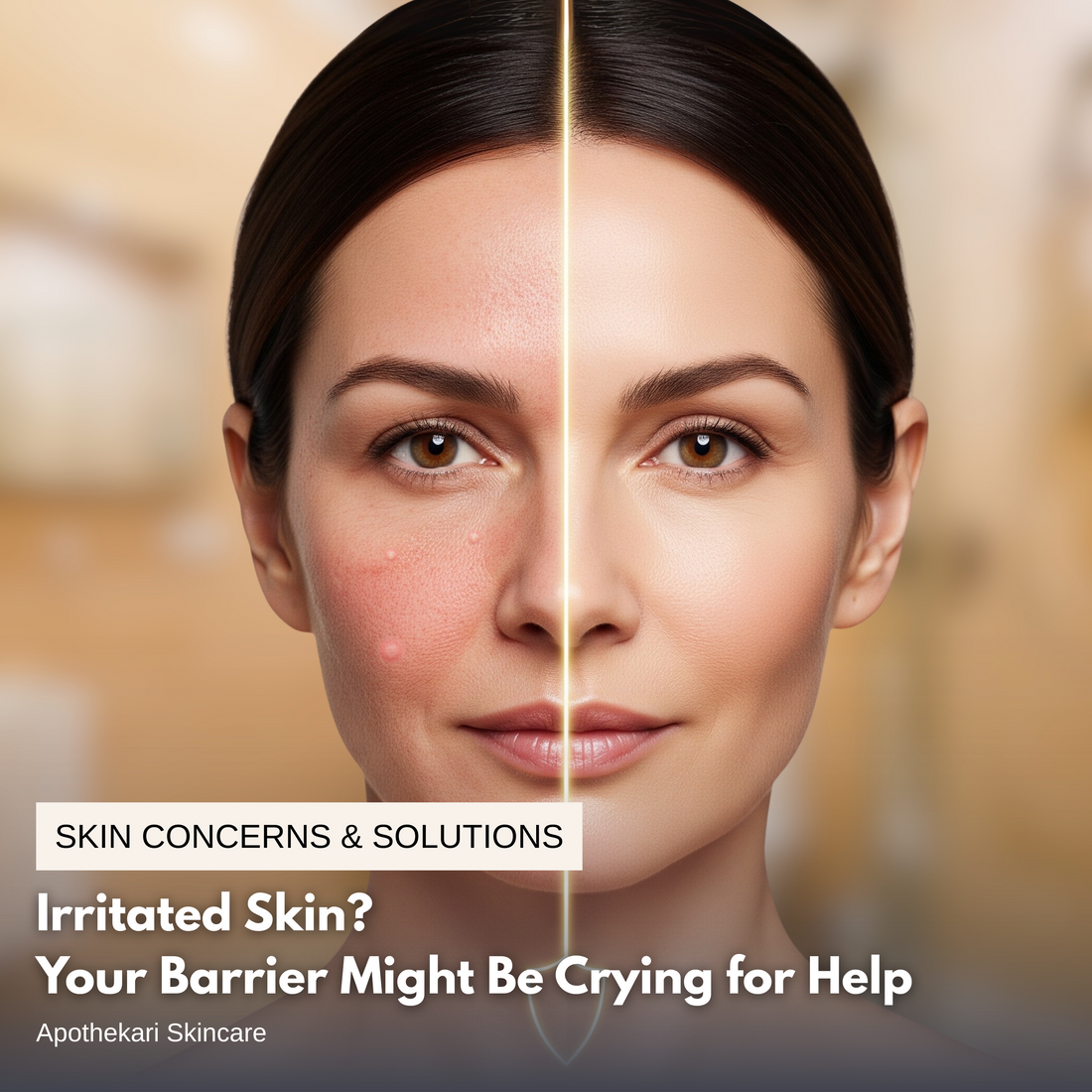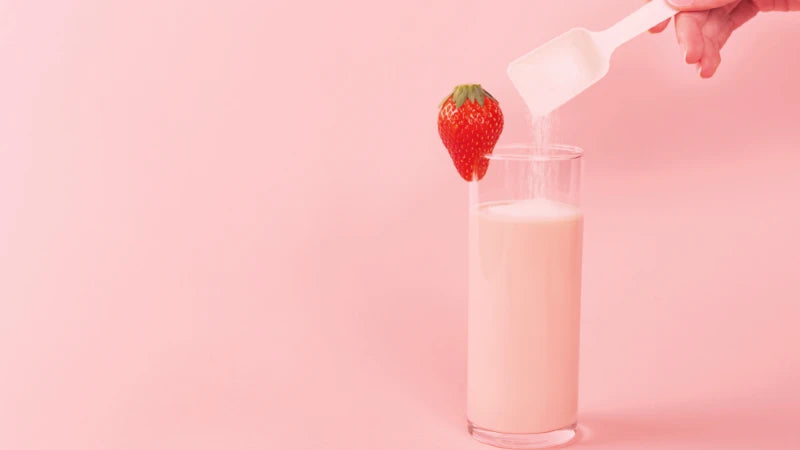Blog
Irritated Skin? Your Barrier Might Be Crying for Help
Skin suddenly acting up? Hormonal shifts can weaken your skin barrier, causing dryness, irritation, and breakouts. The fix: gentle care, deep hydration, and a simple routine to restore your glow.
Learn moreDo Collagen Skin Supplements Give You More Healthy Skin?
Collagen skin supplements are everywhere these days – are they really the promised ‘Fountain of Youth’, or just more hype? In this post, we’re looking at the research to help you decide if taking a collagen supplement makes sense for healthier skin. Can You Rebuild Collagen in Your Skin? Collagen skin supplements are everywhere these days – are they really the promised ‘Fountain of Youth’, or just more hype? In this post, we’re looking at the research to help you decide if taking a collagen supplement makes sense for healthier skin. When it comes to boosting the production of collagen with skincare products, nothing has more research to support this benefit than retinoids. Derived from vitamin A, retinoids like the gentle, yet effective retinadehyde, found in our A is for Anti-Aging Serum, boost collagen production and help prevent its destruction. Retinaldehyde also increases skin cell turnover, and improves skin tone and texture. And, it helps to minimize oil production, decreasing the appearance of pore size and keeping skin blemish free. Don’t you think it deserves a place in your skin care arsenal? Shop A Is for Anti-Aging Serum (Our Retinoid Formulation) Does Collagen Do Anything for Your Skin? Collagen is a protein and the one most abundant in our bodies. Think of it as the glue that holds everything in your body together keeping your tendons, bones, ligaments, joints and your skin, in good shape. Working in conjunction with another protein, elastin, it also helps to keep your skin looking plump and line free. 75% of the dry weight of your skin is made up of collagen, which is rich in amino acids, the building blocks for protein. Unfortunately, as you get older, your body breaks down collagen faster than you can replace it. External factors like sunlight, pollution and smoking, along with a diet high in sugar and refined carbohydrates, can accelerate its decline and impair its repair. Want to get the glowing skin of your dreams? Subscribe to our newsletter list and download our free guide: 5 Tips to Healthy, Glowing 40+ Skin Is It Worth Buying Collagen Supplements? How to Choose One Collagen skin supplements have been promoted as a way to help make up for the loss that you experience as you age. But do they work? A 2019 literature review in the Journal of Drugs in Dermatology found some data to support that collagen could increase skin elasticity, collagen density and overall hydration.* Additionally, supplementation has been shown to help with arthritis pain and sports related joint pain. Many experts believe that the data is promising. And while they are noticing patient benefits, they’d like to see more studies before giving supplements a firm thumbs up. There don’t seem to be any downsides associated with the use of collagen skin supplements so if you’re interested in giving them a try, here are some tips on finding one that’s safe and effective: Look for a high quality source to ensure lack of contamination from heavy metals. The USP and NSF labels in the USA or an NPN number in Canada, mean that the product has been reviewed to meet safety and quality standards. Buy from a reputable company. Do they follow standards like Good Manufacturing Practices (GMP)? Do they offer good customer service policies? Organic, grass fed or pastured may be a good idea, to minimize the risk of BSE. Wild caught fish is another great source. Seek out hydrolyzed collagen or collagen peptides, which are collagen proteins that have been broken down into smaller, more easily absorbed forms. What About Vegan Collagen? Vegan collagen sources don’t exist. However, plant based foods, like spinach, beans, soy, avocados and sunflower seeds, can help to boost your body’s production of collagen. Foods high in vitamin C also play a role in collagen production. Does Collagen Cream Really Work? Since ingesting collagen shows promise, you may think that it’s a good idea to apply it topically. Not so fast! Collagen is a large molecule and while it’s a great moisturizing ingredient, it doesn’t absorb well into skin and cannot replenish lost collagen. The best way to boost collagen production in skin is by using a topical retinoid, like the retinaldehyde found in our A is for Anti-Aging Serum. It works to help boost collagen levels in the skin by increasing the lifespan of collagen, as well as by blocking certain enzymes that destroy collagen. In addition, retinaldehyde can also help facilitate skin cell turnover, improve skin tone and texture, even decrease the appearance of pore size. How Do You Preserve Collagen in Your Skin? These tips will help to prevent collagen degradation: Wear sunscreen every single day to protect skin against UV rays, which break down collagen fibers Consider adding in peptides to help stimulate collagen and elastin production in the skin Use a vitamin C serum, which also helps to boost collagen production *J Drugs Dermatol. 2019 Jan 1;18(1):9-16. Oral Collagen Supplementation: A Systematic Review of Dermatological Applications (Franchesca D. Choi, Calvin T. Sung, Margit L.W. Juhasz, Natasha Atanaskova Mesinkovsk)
Learn more5 Scary Skin Care Habits
In honour of Halloween, today’s post outlines 5 scary skin care habits. These are things we should minimize or avoid as much as possible to ensure the health and wellness of our skin. Shop Cloud Nine Foaming Cleansing Creme 1. Smoking You already know it’s bad for your health; it’s also bad for your skin. Smoking breaks down elastic fibers in the skin (which is why smokers’ complexions look yellow) and amps up the enzyme responsible for breaking down collagen (and that definitely leads to wrinkles), leaving smokers with yellowed, more wrinkled skin. The good news? Quitting will result in improvements – skin texture improves and over time, it becomes brighter too. It’s never too late to quit! 2. Over Cleansing While it’s still important to remove your make-up at night, don’t always reach for the exfoliating, stripping cleanser. Creamy or oil-based cleansers are more gentle and it is a good idea to alternate them with more exfoliating ones. Try Apothekari Cloud Nine Foaming Cleansing Creme. 3. Eating Poorly “You are what you eat”. It’s not just a saying, it really is true. Consuming too much sugar, alcohol or junk food shows on your face. Alcohol is dehydrating and can lead to skin that is dull and blotchy. Try to limit the amount of alcohol you consume by sipping water between drinks. Foods high in sugar or simple carbohydrates, like dessert and potato chips rapidly convert into glucose, which can raise your insulin levels. This leads to inflammation, which ultimately contributes to sagging skin and wrinkles. Digested sugar can also lead to glycation, a process where sugar is converted to advanced glycation end products – AGEs which attach to proteins like collagen causing them to harden. AGEs can also contribute to the development of age spots, dullness, and tumours. 4. Neglecting the Sunscreen You already know that a well formulated sunscreen is one of your best bets against aging skin. Slathering SPF over your entire face even in the winter is a great start, but don’t ignore the rest of your body, including the tops of your hands and exposed décolleté. 5. Skipping Exercise Exercise not only lifts your mood, but the increased blood flow and stress reduction that comes with regular exercise, also shows on your face. Exercise helps to minimize a rise in cortisol, the stress hormone. Once you lessen the spikes of this hormone, your skin will say thank you by way of fewer breakouts and an increased smoothness. Halloween may come every year, but let this year be the one that you banish these scary skin care habits for good and say hello to boo-tiful skin!
Learn more



